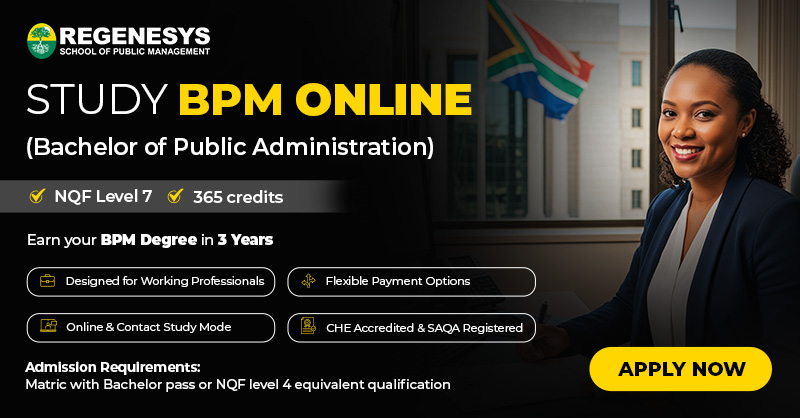Public Management in South Africa is an increasingly in-demand field, blending leadership, policy implementation, and organisational administration. Professionals in this sector play a crucial role in ensuring government programmes and services operate efficiently, effectively, and transparently. With a growing need for skilled managers capable of leading teams, managing projects, and executing policy, students pursuing the Bachelor of Public Management have a strategic pathway to impactful careers.
In this article, we will cover expert advice, strategies, and practical tips to succeed in Public Management in SA.
Table of Contents
- Understanding the Role of Public Management in South Africa
- Is BPM Necessary?
- Mastering Time: Managing Deadlines to Succeed in Public Management in SA
- Gaining Practical Experience: Leveraging Internships for BPM Success in SA
- Staying Informed: Following Policy Trends to Excel in Public Management
- Expanding Knowledge Networks: Joining Industry Webinars for BPM Expertise in SA
- Building Support Systems: Peer Mentorship as a Strategy to Succeed in Public Management
- Expert Tips: Best Study Strategies for BPM in SA
- Conclusion
- Succeed in Public Management in SA – FAQ
Understanding the Role of Public Management in South Africa
Public Management is central to South Africa’s development goals. It focuses on how government institutions, non-profit organisations, and public agencies design policies, manage budgets, and deliver services that directly affect communities. A well-functioning Public Management system ensures that essential services such as healthcare, education, housing, and social welfare are delivered effectively and fairly.
In South Africa, where socio-economic transformation and efficient governance are top priorities, skilled public managers play a vital role in:
- Addressing inequality by implementing policies that promote social justice and inclusion.
- Improving service delivery across essential sectors such as healthcare, education, and housing.
- Strengthening accountability within government institutions and ensuring transparency in decision-making.
- Supporting community development by designing programmes that uplift local economies and provide long-term sustainability.
- Contributing to nation-building efforts through effective leadership and ethical governance.
By studying a Bachelor of Public Management (BPM), students gain the knowledge and tools to directly impact society, influence policy, and drive positive change in their communities.
Read more on Accreditation, NQF Levels, and the Value of a BPM from Regenesys here
Choosing the right BPM programme matters, and our Bachelor of Public Management (BPM) courses at Regenesys are designed to help future leaders build a strong foundation for success. Enrol Now!
Is BPM Necessary?
While there are multiple pathways into public service and management roles, a Bachelor of Public Management (BPM) offers a specialised and practical foundation that is highly relevant in South Africa. This degree equips students with the knowledge, skills, and ethical grounding required to manage government programmes, implement policy, and lead public sector organisations effectively.
Although related degrees such as Political Science, Public Administration, or Management may also open doors in the public sector, BPM specifically combines theory with applied practice in areas like governance, budgeting, and service delivery. This gives graduates a direct advantage when seeking roles in government departments, municipalities, non-profits, or policy-focused organisations.
In short, while it is not the only route into public management careers, a BPM is highly advantageous for students aiming to make a meaningful impact in South Africa’s public sector. It provides targeted expertise, practical exposure, and recognised qualifications that enhance employability and leadership potential.
Mastering Time: Managing Deadlines to Succeed in Public Management in SA
Time management is one of the most critical skills for students aiming to succeed in Public Management in SA. The demands of coursework, assignments, projects, and practical internships require careful planning. Students who struggle with managing deadlines often face academic setbacks and unnecessary stress.
Practical approaches to effective time management that can help students succeed in Public Management in SA include:
- Prioritise Tasks: Identify urgent and important assignments and complete them in order of significance.
- Structured Study Timetables: Allocate dedicated hours for lectures, self-study, and assignment completion.
- Break Projects into Milestones: Divide large tasks into smaller steps to monitor progress efficiently.
- Use Digital Tools: Employ apps like Google Calendar, Trello, or Microsoft To-Do for reminders and task tracking.
- Weekly Reviews: Assess progress at the end of each week to identify outstanding tasks and adjust priorities.
Read more on Why More Working Professionals Prefer Online BPM for October Enrolment here

Gaining Practical Experience: Leveraging Internships for BPM Success in SA
Practical experience is invaluable in Public Management. They help to bridge theoretical knowledge with real-world application. Internships allow students to witness governance in action, contribute to public service projects, and develop professional competencies.
Listed below are some of the main benefits of internships:
- Hands-On Exposure: Learn how policies are implemented in government or municipal offices.
- Professional Networking: Establish connections with mentors, colleagues, and leaders in the public sector.
- Skill Enhancement: Develop critical skills such as communication, project coordination, and leadership.
- Career Clarity: Gain insight into preferred areas within Public Management for long-term planning.
The table below illustrates the various types of internships that BPM students can explore:
|
Internship Type |
Focus Area |
Benefits |
|
Government Departments |
Policy implementation |
Gain practical governance experience |
|
Municipal Offices |
Local administration |
Understand community-focused service delivery |
|
Non-Profit Organisations |
Programme management |
Contribute to social development projects |
|
Research Institutions |
Policy analysis |
Build analytical and data interpretation skills |
By engaging in internships, students can apply BPM expert tips for SA and prepare to succeed in Public Management in SA, improving employability upon graduation.
Read more on Financial Tips for First-Generation BPM Students: Survive and Thrive here
Staying Informed: Following Policy Trends to Excel in Public Management
Staying informed on policy developments is crucial for students aiming to excel in Public Management. Understanding shifts in legislation, budget allocations, and regulatory frameworks enables students to apply classroom knowledge to real-world scenarios.
Ways to stay updated that will also help students succeed in Public Management in SA include:
- Subscribe to Government Publications: Regularly review departmental newsletters and official gazettes.
- Monitor Industry Reports: Research organisations provide insights into the effectiveness of policies.
- Attend Public Meetings: Engage with community or municipal forums to understand local governance challenges.
- Follow Online Platforms: Platforms such as www.gov.za provide detailed policy updates and analyses.
The table below outlines how following policy trends supports academic and professional success:
|
Method |
Description |
Benefit |
|
Government Publications |
Track changes in legislation |
Enhances decision-making |
|
Industry Reports |
Research-backed analysis |
Strengthens analytical skills |
|
Public Meetings |
Attend local governance forums |
Gain practical insights into community needs |
|
Online Platforms |
Access policy updates online |
Apply knowledge to practical scenarios |
By consistently following policy trends, students develop a strategic perspective and are better positioned to succeed in Public Management in SA.
Read more on Top Sectors Hiring BPM Graduates in 2026 from the October Intake here

Expanding Knowledge Networks: Joining Industry Webinars for BPM Expertise in SA
Webinars and online workshops are powerful tools for students seeking to expand their expertise. They provide opportunities to learn from industry professionals, discuss current challenges, and develop networks within the Public Management field. Many of these webinars are available at no cost, which makes them especially accessible for undergraduate students pursuing a Bachelor of Public Management(BPM).
Participating in free sessions not only broadens knowledge but also helps students connect with practitioners and peers, gaining insights that complement their academic studies and future careers. Webinars help students develop insights beyond textbooks, equipping them with the knowledge to apply BPM expert tips for SA and succeed in Public Management in SA.
Benefits of attending webinars include:
- Expert Insights: Gain knowledge from experienced public administrators.
- Interactive Learning: Engage in question-and-answer sessions to deepen understanding.
- Networking Opportunities: Connect with professionals and peers across South Africa.
- Flexible Participation: Access sessions online, suitable for students balancing study with work.
Building Support Systems: Peer Mentorship as a Strategy to Succeed in Public Management
Peer mentorship is a vital tool for students navigating the Bachelor of Public Management. Learning from peers who have successfully managed similar challenges can enhance study habits, understanding of coursework, and personal development.
Benefits of peer mentorship include:
- Shared Learning Experiences: Gain insights from peers who have navigated first-year challenges.
- Accountability Partners: Encourage consistent study routines and timely completion of assignments.
- Emotional Support: Reduce stress and build confidence.
- Collaborative Learning: Improve comprehension through group study sessions.
The table below summarises how peer mentorship can help students succeed in Public Management in SA:
|
Mentorship Role |
Function |
Benefit |
|
Senior Student Mentor |
Guidance on subjects and projects |
Reduces first-year challenges |
|
Study Buddy |
Collaborative study sessions |
Improves understanding and retention |
|
Accountability Partner |
Track deadlines and assignments |
Avoid study planning errors SA |
|
Emotional Support |
Encourage and motivate |
Boosts confidence and engagement |
By building a network of supportive peers, students reinforce their ability to implement BPM expert tips for SA and succeed in Public Management in SA.
Read more on Staying Motivated During Your BPM Journey While Working Full-Time here
Expert Tips: Best Study Strategies for BPM in SA
To succeed in Public Management in SA, students must adopt structured and practical study methods that strengthen both academic performance and workplace readiness. A Bachelor of Public Management (BPM) requires consistent discipline, critical thinking, and the ability to apply theory to real-life challenges.
The following BPM expert tips for SA highlight strategies that every student can use to stay ahead:
- Structured Planning: Create a weekly timetable that balances lectures, assignments, self-study, and rest. Sticking to a routine helps prevent last-minute stress and builds long-term consistency.
- Active Learning: Go beyond reading textbooks by engaging in debates, case studies, simulations, and class discussions. This makes theoretical knowledge more practical and easier to retain.
- Regular Assessment: Test your understanding regularly with practice essays, mock exams, and quizzes. This self-check method allows you to track progress and identify weak areas early.
- Guided Support: Make use of academic resources such as tutor consultations, peer mentorship, and study groups. Collaborative learning strengthens problem-solving skills and provides motivation.
- Balanced Approach: Blend multiple learning resources, including online journals, academic databases, workshops, and practical assignments. Using diverse inputs ensures a well-rounded understanding of Public Management in SA.
- Digital Integration: Explore learning apps, digital planners, and free webinars that support time management and broaden perspectives on governance and policy issues.
By implementing these best study strategies for BPM in SA, students gain the tools to manage their workload effectively, improve retention, and prepare for leadership roles in government, non-profits, and public sector organisations. Strong study habits are not only valuable for achieving academic success but also for building the confidence needed to excel in a professional Public Management career.

Conclusion
Succeeding in Public Management in SA requires a combination of time management, practical experience, continuous learning, networking, and disciplined study. By managing deadlines, leveraging internships, staying informed on policy trends, attending webinars, and participating in peer mentorship, students can navigate first-year challenges effectively.
The Regenesys Bachelor of Public Management programme is designed to provide both theoretical knowledge and practical skills, enabling students to apply concepts, develop leadership qualities, and prepare for rewarding careers in government, municipalities, and public service organisations.
To explore our accredited programme further and take the next step towards a career in Public Management, visit the Regenesys website today!
Succeed in Public Management in SA – FAQ
What is Public Management in South Africa?
Public Management focuses on leadership, policy execution, and service delivery within government and non-profit organisations. It equips professionals to improve efficiency, transparency, and accountability in public service.
Why is Public Management such a growing field in South Africa?
South Africa faces increasing demand for skilled managers who can oversee governance processes, manage resources, and ensure effective service delivery to communities. This makes Public Management a vital and rewarding career choice.
How can I succeed in Public Management in SA as a student?
You can succeed in Public Management in SA by mastering time management, engaging in internships, staying informed on policy trends, joining industry webinars, and developing strong study strategies through peer mentorship and guided support.
What are the best study strategies for BPM in SA?
The best study strategies for BPM in SA include structured planning, active learning through case studies, regular self-assessment, collaborative learning, and integrating digital tools to manage workloads effectively.
Does the Regenesys Bachelor of Public Management offer practical experience?
Yes. The programme is designed to blend academic theory with practical application. Students are encouraged to pursue internships, projects, and applied assignments to build real-world skills.
Are webinars and online workshops useful for BPM students?
Yes. Many webinars are free and provide valuable insights from experts in governance, leadership, and policy. They also offer networking opportunities and real-world knowledge beyond textbooks.
Why should I study Public Management at Regenesys?
Regenesys offers an accredited Bachelor of Public Management designed to equip students with both leadership skills and practical knowledge. The programme prepares graduates for impactful careers in government, non-profits, and public service organisations.







